What struck me immediately after my dad died is that the grief I felt seemed simultaneously the most and the least unique feeling in the world: in its singularity no one could understand it; yet in its universality, to some extent, everyone could. I was comforted by this; by this sense that millions and millions of people have been in this situation and got through it. Time rolls on.
I find it interesting that in the therapy I’ve had since he died uniqueness and originality are subjects I’ve returned to again and again. Primarily, it has to be said, I’ve spoken about these subjects in terms of disappointment at realising that aspects of my personality I’d always thought were just completely my own are not really, after all, so unique. I don’t know what it might mean; perhaps it’s some sort of accounting I’m carrying out: what’s me; what was him etc? Perhaps, as well, I may just have sublimated the wanting of an original grief; that desire then emerging in another form? I find a possibility of truth in that. I realise I have a problem with grief: I feel guilty about indulging it. My dad dying was the terrible thing and that anything else might come close to causing me an equivalent level of pain – I mean even my grief over him dying – feels like something awfully hard to accept.
Last Thursday it was exactly four months since he died. I went to work; I sat at my desk; I talked to my colleagues; and I checked Facebook and my Gmail. I left at half five for an appointment with my therapist. The beginning of the week I’d felt very focussed on the coming Thursday; I’d expected it to be a tough day. As it turned out, for the biggest part of the day, it wasn’t tough at all. After seeing my therapist though things seemed totally to fall apart. I don’t know how to describe what happened other than to refer to those times a person feels hyper: a lot of energy; and, I guess, a kind of excitement at the things you might be able to do whilst in this mood; with it only slowly dawning on you that this excitement is a waste of time as this energy is directionless and impossible to focus. Well I had kind of the opposite of all that. There seemed to be a hyper-ness about how I felt, sure; yet instead of excitement featuring it absolutely was a down mood. And even now, two days later, I still don’t feel certain what happened: either I’d accessed something I’d tried to deny or I’d given one thing the name of something else out of a sense of dutifulness or, perhaps, a mixture of the two.
I wanted to tell my friend on Thursday about the significance of the day. I didn’t though. I wanted to tell it just as news but I was concerned, rather, it might come out as some kind of plea for sympathy. I’m not in a position yet to be able to assess the rights and wrongs of this.
This time last year I was involved in a brief relationship with a woman I’d met, in all places, via Facebook Scrabble games. I’d been playing online Scrabble for months – not in the hope of meeting anyone; just because I liked Scrabble – and opponents always seemed to be from London or Australia or somewhere; anyway, places very far away from where I live; this woman was from Stockport – just round the corner, effectively. Anyway, her dad had died some years earlier and she missed him very much; and she got it into her head that she wanted to meet my dad. As time passed this seemed to become more and more of a preoccupation for her; yet, it began to seem to me, more a kind of theoretical preoccupation than an actual one. What I mean is she liked to discuss meeting my dad yet never wanted to make any actual plans to that end. So the meeting never happened. She would always ask though, often even before she’d asked how I was, if my dad was okay. Since he died I’ve wondered on several occasions if I should get back in touch with this woman to let her know about my dad. I haven’t though. I think the occasions when I do consider this are times when I very much do want sympathy – and not necessarily perhaps for reasons connected to my dad. To use his death then as a means of acquiring that sympathy would feel very wrong to me.
Empathy is possible, absolutely. Regarding this idea of ‘genuine empathy’, well, if ‘genuine empathy’ is only possible between like and like I reckon it’s an idea that’s better off ditched. A person can understand and share another person’s feelings, sure; of course though they can’t access those same feelings in their particularity and uniqueness. Over these past four months I’ve been hugely grateful for the support of family and friends.
Since he died I have cried loads. The most recent time being last night at the thought of sorting through his clothes which I knew I’d be doing today. So far I haven’t cried today.
Tonight I will drink two cans of lager. Two because it’s that there are only two in the fridge. In the days and weeks following his death I drank loads and I drank all manner of stuff. The main reason for my drinking was, I think, because I just didn’t want to be at home – the home I’d lived in all my life with my dad. Drinking took me to the pub. It put me amongst people – alright, most of the time not people I was talking to (generally I’d be in the pub alone with just a book for company); it made that period between getting into bed and falling asleep last probably just minutes; drinking had a lot going for it. Today, mentioning to my aunt about the two cans I’d had last night as well, I realised something had changed: recently I’ve been drinking less.
About a month after my dad died the mothers of two friends at work died. Then the month after that the mother of a third friend died as well. I don’t think there were sky high expectations of me being able to prove particularly empathetic given what I was going through myself; and that was perhaps fortunate for me. Mike said to me though that people he would have expected a lot from at that time had, he felt, let him down; whereas people he didn’t expect so much from had really delivered. The reason for me saying this – I assume it’s clear – is that he felt I’d delivered. He meant, I think, I’d said stuff to him which was appropriate and which was useful. I’d found that easy to do though. As I said to him, perhaps I knew what to say because I’d so recently gone through this stuff myself. And that easiness is something I just don’t trust. It feels like due to it being so easy for me to know what to say what I said can’t have meant too much. Really, I mean, how useful are words? And I feel my sense of their uselessness takes something away from them even as I’m saying them. Still though, at such times words are often all we have to give.
How do we learn about death? We can learn about it from books, sure; but from books we’ll only take the generalities. Death in its horrible particularity is something we can only begin to learn about as we see those around us we love die.
***
Richard Barrett lives and works in Salford, UK. His poetry collections are Pig Fervour (Arthur Shilling Press, 2009); Sidings (White Leaf Press, 2010); A Big Apple (Knives Forks and Spoons, 2011); # (zimZalla, 2011); The Shangri Las (erbacce, 2013); with, forthcoming, Free (Blart Books, 2014). His work has been widely anthologized; most recently in Philip Davenport’s The Dark Would. He is a co-organiser of the Manchester based reading series Peter Barlow’s Cigarette.


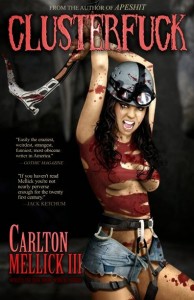


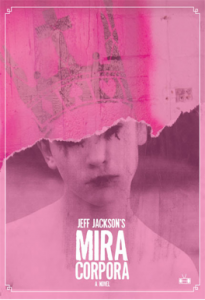
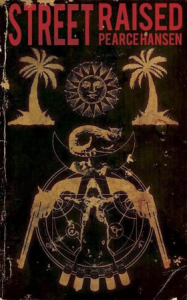
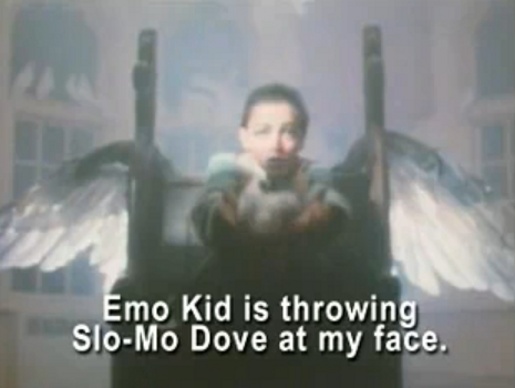
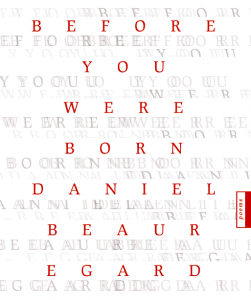

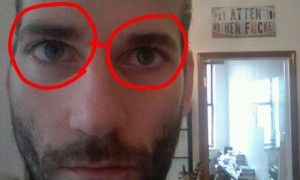
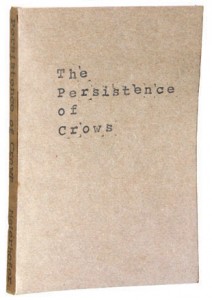 The Persistence of Crows
The Persistence of Crows  GO TO WORK AND DO YOUR JOB. CARE FOR YOUR CHILDREN. PAY YOUR BILLS. OBEY THE LAW. BUY PRODUCTS.
GO TO WORK AND DO YOUR JOB. CARE FOR YOUR CHILDREN. PAY YOUR BILLS. OBEY THE LAW. BUY PRODUCTS.